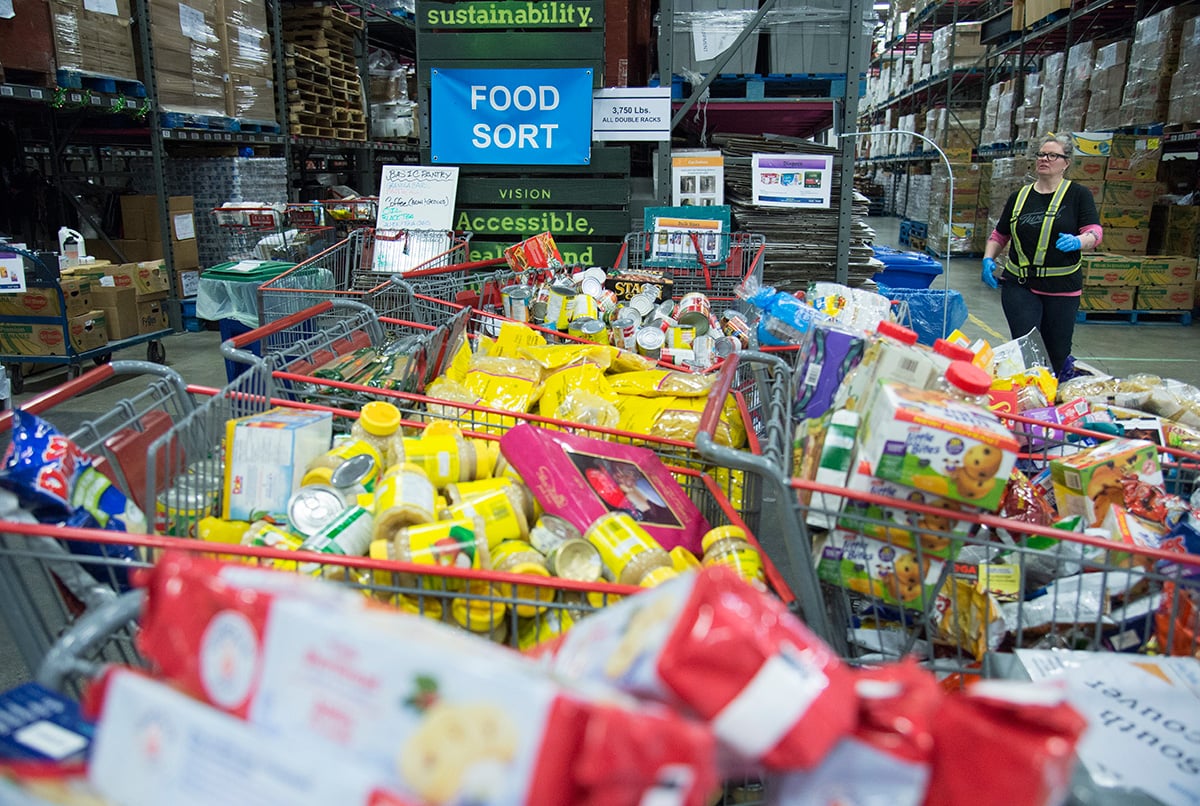After a surge in demand this spring and summer, food banks and other food networks are preparing for a possible second wave of COVID-19 and a corresponding rise in need.
But not everyone agrees on what kind of response is best.
Dan Huang-Taylor, executive director at Food Banks BC, said he expects another surge soon, and food banks are planning how to operate in unfavourable conditions. Many locations will set up tents and outdoor heaters and introduce ticketing and appointment systems, he said.
Cynthia Boulter, chief operating officer at the Greater Vancouver Food Bank, said that with some government supports winding down for individuals, “We’re not sure what to expect.”
Early in the pandemic, many food bank sites in community centres and neighbourhood hubs were forced to close. The Greater Vancouver Food Bank eventually turned the empty Queen Elizabeth Theatre into a central distribution site, which increased access. An injection of $100 million in federal funds to food banks across the country also helped get other sites running smoothly.
“We used some of the federal funding provided by Food Banks Canada to build capacity and sustainability into our neighbourhood partners and houses,” Boulter said. “We’ve bought industrial size fridges and freezers and at least 14 community agency partners are [using] that refrigeration facility.”
The food bank is now able to provide food for about 450 people per week, up from pre-COVID numbers of 250 per week. Refrigeration space at a Burnaby warehouse has increased 400 per cent to accommodate donations and the food bank also purchased a lot of non-perishable food.
Katie German, director of programs at FoodShare in Toronto, said her organization is still responding to food needs caused by the first pandemic wave.
“The map of COVID-19 hotspots closely resembles the map of food insecurity,” she said.
The number of new food bank users has tripled since the same time last year in Toronto, she said. Her organization now delivers around 3,000 food boxes a week, up from the usual 300. FoodShare differs from food banks in that the organization doesn’t accept donated food from corporations or individuals, instead distributing fresh food produced by local growers.
FoodShare has also worked to create more community-run produce markets in public parks or in lobbies of housing buildings. German said they are good options for those who are immunocompromised or have limited mobility.
Sarah Kim is food co-ordinator at the Vancouver Neighbourhood Food Networks, which includes groups that work on food security across the city. “We’re never going back to the levels of food insecurity recorded before COVID-19, because more people are going to be unemployed and access to food is going to be harder,” she said.
Kim fears that the second wave may already be here as B.C. continues to rack up new cases. The groups in her network have seen a decrease in volunteers lately, she said. “We’re sensing that it’s the calm before the storm, so we are mentally preparing ourselves.”
Kim considers food a vehicle for building community and relationships and doesn’t think the food bank charity model is the right answer to food insecurity. “To address food insecurity, we need to be thinking more upstream.”
The Vancouver Neighbourhood Food Networks is addressing food insecurity in different ways, Kim said. “Some networks have been doing community kitchens online. They decide on a recipe, and people come on Zoom to cook and eat together. We’re also delivering those ingredients to everyone,” she said.
That use of community to address food insecurity has been a catalyzing force for Karen Secord, executive director at Parkdale Food Centre, a not-for-profit charity based in Ottawa.
Parkdale has run community kitchens since January, but the pandemic brought changes. Rather than shut down, it reached out to social service partners and a local foundation and adapted.
“With city funding and collaborations with 14 restaurants, we’re now making 4,000 meals a week for 22 social service agencies, which is going to harm-reduction services, isolated seniors, families and community houses,” Secord said.
Secord said people need to rethink food charity, in particular the idea that shelf-stable items are better than fresh, unprocessed food. “We’ve heard things like ‘beggars can’t be choosers, I give them Kraft Dinner, so they should be damn lucky that I’m giving it to them’ and such.”
She wants people to let go of the belief that someone’s poverty is their fault and finds traditional food banks built on the charity model problematic.
“During the pandemic, the Ottawa Food Bank offered standard food boxes. We opted out. We’re not giving our people a standard box. People are not standard. They come from different cultures, they cook differently,” she said.
Secord would like people to think critically about the food charity model. “We have a problem of economic inequality and equity. Food banking is a racist concept because Black, Brown and Indigenous People are experiencing inequity at a far greater rate than anyone else.”
Parkdale is preparing for the second wave by increasing accessibility and eliminating digital barriers. “We are giving out Chromebooks and six months of internet to people to minimize social isolation and have people participate in our cooking workshops,” she said.
The BC Poverty Reduction Coalition, an alliance of organizations that raises awareness about poverty, has also worked to improve internet access to reduce food insecurity.
“Low-income and marginalized community members need the internet even for finding out where they can access their daily meals,” said Viveca Ellis, the coalition’s interim organizer.
She calls for a multifaceted approach to tackle food insecurity that includes advocating for universal basic services. Free transit for children and youth, for example, would help low-income families who have to travel to access food, she said.
Food insecurity is an income issue, she said.
“When COVID-19 hit, our governments began investing millions in emergency funding to address food insecurity,” Ellis said. “Had we invested in building our social safety net, we wouldn’t have wasted millions on an emergency downstream response.”
The coalition is calling for the government to continue emergency rental assistance programs and a ban on evictions, as well as raise the income and disability rates above the poverty line.
Graham Riches, emeritus professor and former director of the School of Social Work at the University of British Columbia, is also critical of the food bank model. “Food banks are really at the end of the global, national and local food supply chains. The food is dependent upon what’s coming to them and bottlenecks in the way. That’s not an assured way of ensuring vulnerable populations are acquiring food.”
Before COVID-19, according to research by Proof, over 65 per cent of Canadians who lived in food insecure households were the working poor. Riches believes that COVID-19 has hit that group the hardest, and a second wave will make it worse.
Providing people with an adequate basic income would solve that, he said.
“If the basic income is not adequate, then we’re still going to have food banks around. The logic is to enable you to purchase your food and pay the rent, so that no one should be left behind.” ![]()
Read more: Rights + Justice, Food, Coronavirus
















Tyee Commenting Guidelines
Comments that violate guidelines risk being deleted, and violations may result in a temporary or permanent user ban. Maintain the spirit of good conversation to stay in the discussion.
*Please note The Tyee is not a forum for spreading misinformation about COVID-19, denying its existence or minimizing its risk to public health.
Do:
Do not: